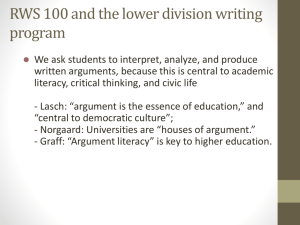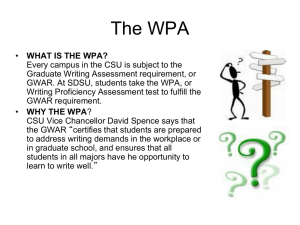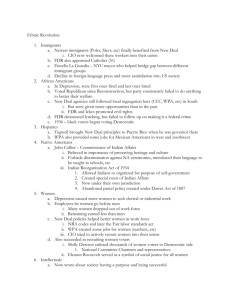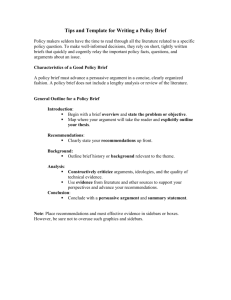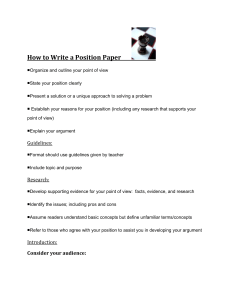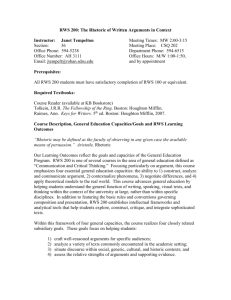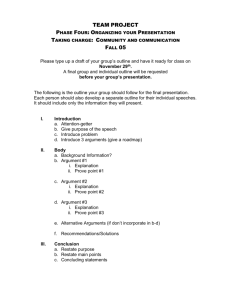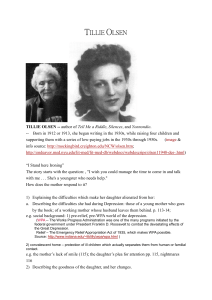End of semester
advertisement
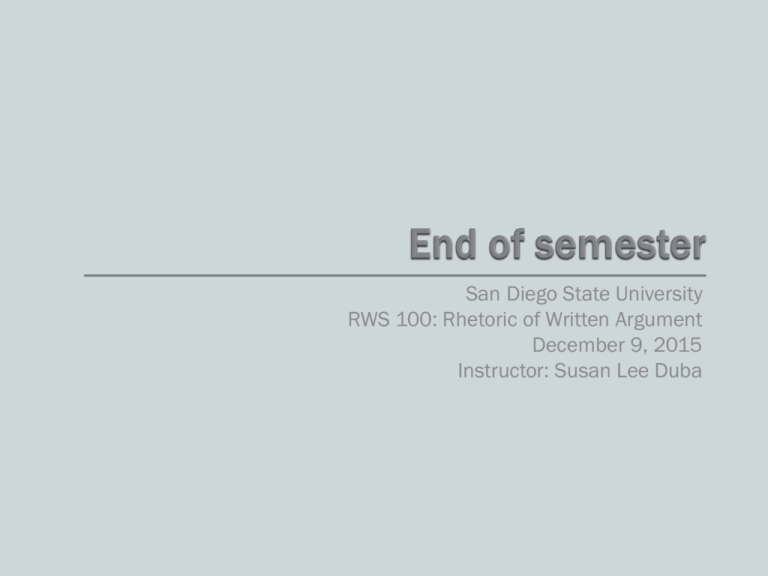
San Diego State University RWS 100: Rhetoric of Written Argument December 9, 2015 Instructor: Susan Lee Duba Follow the instructions on the final reflection on document camera We ask students to interpret, analyze, and produce written arguments, because this is central to academic literacy, critical thinking, and civic life - Lasch: “argument is the essence of education,” and “central to democratic culture”; - Norgaard: Universities are “houses of argument.” - Graff: “Argument literacy” is key to higher education. identify claims evaluate evidence and reasons locate assumptions identify argumentative moves pose critical questions produce sophisticated arguments Why? It’s key to your professional futures – every gateway requires it The ability to interpret arguments, locate claims and evidence, analyze moves and strategies, and evaluate arguments are crucial skills. They are central to business, law, professional life, and to academic study (including graduate school). Students tested for these skills in the WPA, the LSAT, GMAT, and GRE – all the gateways to professional life. Consider the LSAT… FIND THE MAIN CLAIM Pediatrician: “Some parents have decided not to have their children receive the MMR vaccine because they fear that it may cause autism. They cite a study that found a possible link between the vaccine and the disease. However, two other much larger studies have found no link between the MMR vaccine and autism. These parents have, therefore, willfully put their own children and many others at risk of catching measles, mumps, and rubella, while failing to do anything to prevent their children from becoming autistic.” Which most accurately expresses the main claim of the pediatrician’s argument? (A) Parents should not pay attention to medical studies because they can’t understand them; instead, they should get advice from their pediatricians. (B) The study that found a link between autism and the MMR vaccine was unsound because the doctor who conducted it was being paid by a group of trial lawyers who wanted him to find a connection so they could carry out a lawsuit. (C) Public health needs require that parents have their kids vaccinated regardless of their fears about the procedure. (D) Parents’ refusal to have their kids take the vaccine is both medically unjustified and dangerous, because the vaccine has known disease-preventing benefits and refusing it will have no effect on whether their kids become autistic. (E) Despite the results of the two large studies, there is still some possibility that the MMR vaccine might cause autism. Present Your Views on an Issue (45 minutes, choice of 2 topics) Analyze an Argument (30 minutes) Each essay is scored on a 0-6 scale using holistic scoring Two scores for each essay GRE Website presents directions, actual topics, scoring guide, and sample essays for both the Issue and Argument tasks (www.gre.org/gentest.html) Articulate complex ideas clearly and effectively Examine claims and accompanying evidence Support ideas with relevant reasons and examples Sustain a well-focused, coherent discussion Control the elements of standard written English In Wolfe’s 2010 study, assignments from a broad range of disciplines were collected and examined. Results? “A majority of writing assignments (59%) required argumentation. All engineering writing assignments required argumentation, as did 90% in fine arts, 80% of interdisciplinary assignments, 72% of social science assignments, 60% of education assignments, 53% in natural science, 47% in the humanities, and 46% in business. Argumentation is valued across the curriculum. Example: Stockton found that the history faculty she interviewed unanimously, “agreed that argument is the key word for good writing and that the absence of argument constitutes the central problem in students’ written work” (Wolfe, p. 50). This finding was echoed in other fields. Richard Arum and Josipa Roksa’s Academically Adrift, a comprehensive review of undergraduate education, identifies lack of argumentation skills as a major problem. (They also show that liberal arts degrees produce some of the most literate, sophisticated thinkers) These are points you may want to share with future employers, on grad applications, etc., as you are part of an unusually comprehensive and integrated writing program. RWS 200 – Rhetoric of Written Argument in Context Similar types of assignments, but there is more focus on context. Rhetorical analysis Researched final paper The WPA Exam What is the WPA? Every campus in the CSU is subject to the Graduate Writing Assessment requirement, or GWAR. At SDSU, students take the WPA, or Writing Proficiency Assessment test to fulfill the GWAR requirement. Why the WPA? CSU Vice Chancellor David Spence says that the GWAR “certifies that students are prepared to address writing demands in the workplace or in graduate school, and ensures that all students in all majors have the opportunity to learn to write well.” “The WPA focuses on your ability to read and analyze written arguments. It measures your ability to express yourself clearly, logically and specifically and to organize and develop your ideas well. In addition, it assesses your ability to write coherent paragraphs and appropriately structured sentences.” Two hour exam Short reading provided on test day Write an essay responding to a series of questions related to the reading • Questions focus on analysis of the argument rather than a personal response • Assess how the author uses rhetorical strategies • Evaluate (using evidence from the reading itself) how convincing the argument is Identify and provide a brief explanation of the author’s argument; identify two persuasive strategies that the author uses to support his or her argument and analyze how those strategies might persuade the reader to support the claim; discuss the assumption(s) on which the argument is based; and evaluate the extent to which the reader would find the argument convincing. Be sure to follow these directions carefully, rather than simply agreeing or disagreeing or writing an extensive summary of the article. Describe, Explain, Discuss: Moving beyond summary, these terms require you to analyze, to go beyond what is written to how it is written. Effective description, explanation, and discussion are objective and impersonal, rather than subjective. Furthermore, they employ specific, direct, concrete language. [Do versus say] Strategies: Moves or devices that help build and support arguments. Commonly used strategies include examples, statistical support, appeals to the emotions of the reader (pathos), demonstrations of authorial credibility (ethos), analogies and comparisons, irony, refutations of opposing arguments, and quotations from experts and famous sources. Stylistic devices such as repetition, alliteration, and metaphor can also be characterized as strategies. Evaluate: More subjective than objective analysis, evaluation requires judgment and assessment based on explicit criteria, reasoning, and evidence. Evaluating an argument goes beyond declaring whether or not you agree with it. You are required to assess how its strengths and weaknesses contribute to or undermine its convincingness. Attention to the writer’s efforts to respond to potential opposition is particularly important. Premise and Assumption: Treated as synonyms in this assignment, premises and assumptions are the principles, propositions, beliefs, and values upon which arguments or parts of arguments rest. Premises and assumptions can be explicitly stated or implicit (merely implied or suggested) in an argument. They are effective to the extent they come to be shared by the reader and writer, thus forming “common ground. Q: When do I take the WPA? A: Continuing students must take the WPA during the semester in which they are completing 60 units or in the semester immediately following. Transfer students are eligible to take the WPA once they have received an offer of admission. They must take the examination by the end of their first semester at SDSU. Q: How many times can I take the WPA? A: Students are allowed to attempt the WPA twice within the time frames and restrictions described in the question above. Q: What happens if I don't take the WPA during the required time frame? A: Students who do not take the examination by the end of the required time frame will not be able to register for future terms. Q: Can I see sample WPA tests and explanations of how they were scored? A: see the GWAR site: http://wpa.sdsu.edu/samples.html Q: What are the scoring criteria? A: They are listed here, and connect closely with skills covered in RWS 100 http://wpa.sdsu.edu/scoring.html RWS 280 Score 6 or less RWS 281 (ESL) RWS 305W (General/ Engineering) (60 credits) RWS 100 RWS 200 WPA Score 8 or 9 Score 10 RWS 503W (Professions) RWS 500 (Grad Writing) No "W" class req'd unless major req's it: English, History, etc. (See your advisor) You’ll likely take RWS 200 next semester. I suggest you take the WPA right after that, when you’re most familiar with material from RWS 100 and 200. If you take it early and don’t score well, you can meet with an advisor to review your exam, and still have plenty of time to re-take it. Don’t leave it until late (when you’re getting ready to graduate – what would happen if you needed a class? You don’t get to graduate – I’ve seen it happen). Other information is available at: wpa.sdsu.edu Contact the Testing Office for details: http://studentaffairs.sdsu.edu/testofc/ Similar to your reflection, we ask students to complete evaluations after every class. Why? You’re a valuable resource for assessing how we’re doing in the class. We want your input. It’s how I’m evaluated by my department, and how the department is evaluated by the university. Professionalism evaluation – part of being in a job is When completing, I ask that you: Treat them as a professional task Be honest, but constructive with feedback If something truly doesn’t work, we need to know. If you want to vent, don’t do it here. There are other resources for that. When should you do the evaluation? As soon as possible (when they become available) so the class is fresh in your mind Paper due (Tii through BB): 11:30pm Monday, December 14th. What if I turn my paper in late? Turned in between 11:30pm Dec 14 and 11:30am Dec 15 = penalty is loss of full letter grade Turned in after 11:30am Dec 15 = ZERO points for Paper 4
